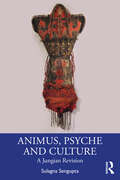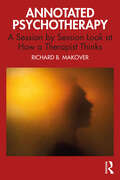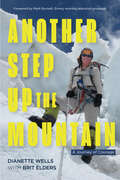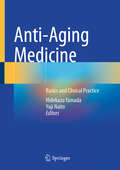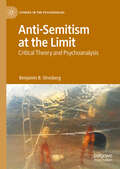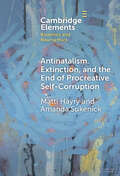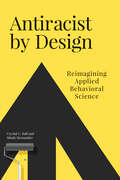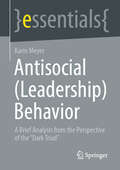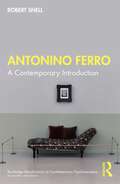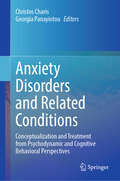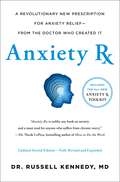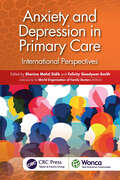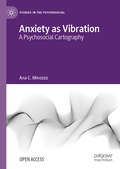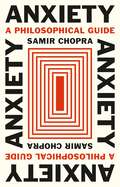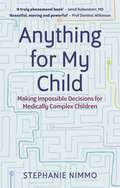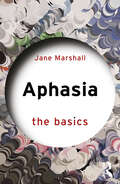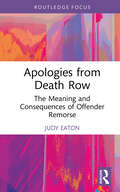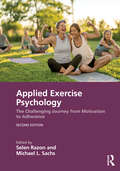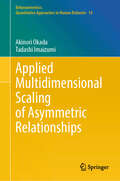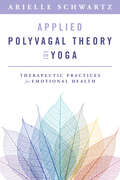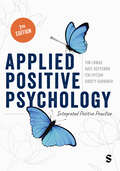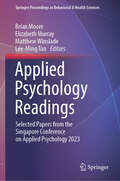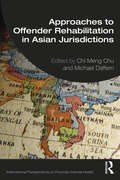- Table View
- List View
Animus, Psyche and Culture: A Jungian Revision
by Sulagna SenguptaAnimus, Psyche and Culture takes Carl Jung’s concept of contra-sexual psyche and locates it within the cultural expanse of India, using ethnographic narratives, history, religion, myth, films, biographical extracts to deliberate on the feminine in psychological, social and archetypal realms. Jung’s concept of unconscious contra-sexuality, based on notions of feminine Eros and masculine Logos, was pioneering in his time, but took masculine and feminine to be fixed and essential attributes of gender in the psyche. This book explores the relevance of the animus, examining its rationale in current contexts of gender fluidity. Taking off from Post Jungian critiques, it proposes an exposition of the animus in history, social and religious phenomena, theories of knowledge, psychoid archetype and synchronicity, to grasp its nuances in diverse cultural worlds. This study re-envisions the notion of animus keeping in mind the intricacies of feminine subjectivity and the diversity of cultural worlds where depth psychological ideas are currently emerging. A remarkable reworking of Jungian ideas, this well-researched and important new book will be an insightful read for Jungian analysts and scholars with an interest in cultural and gender studies.
Annotated Psychotherapy: A Session by Session Look at How a Therapist Thinks
by Richard B. MakoverAnnotated Psychotherapy demonstrates how an experienced psychotherapist develops and carries out the right treatment plan through interactions with the patient or client. In these pages, clinicians will find an explanation of everything the therapist says to patients or clients: why they say it, what they intend it to do, how it fits in with the treatment plan for that person, and, importantly, what might have been said that would be better. Each of the eight sessions are presented in the form of a transcript that shows how a seasoned clinician might conduct the session—what their internal judgments are and what reasoning or rationale they might have for the therapeutic interventions they choose. Discussion sections after each transcript and a glossary provide helpful explanatory material for the key ideas and concepts, making this book an enlightening resource for therapists working and training in psychotherapy, whether their background is psychology, social work, psychiatry, or counseling.
Another Step Up the Mountain: A Journey of Courage
by Brit Elders Dianette WellsA True Story of Triumph Over Adversity and the Loss of a ChildIn this gripping memoir, learn the true story of how mountaineering and extreme sports enthusiast Dianette Wells endures the devastating loss of her son and learns to balance motherhood with a life of extreme adventure.Climbing over adversity. In her groundbreaking memoir, Another Step Up the Mountain, Dianette tells of her unique experiences climbing the Seven Summits, participating in adventure races (including four Eco-Challenges and ultra marathons around the world), as she raised three wonderful children. Trying to survive a tumultuous marriage, Dianette felt empty and unhappy. However, everything changed when she discovered adventure racing. Full of beautiful and uplifting moments, Dianette’s story will inspire you to discover the meaning of joy in your own healing journey.Grief recovery and restoration with every step of the way. In 2015, Dianette lost her son Johnny to a wingsuiting accident, driving her to withdraw into severe depression. However, with the support of those around her, Dianette’s desire to compete in endurance sports and her love of mountain climbing helped her find an inner strength to begin healing. As she had in the past, she faced adversity and found her inner power by embracing her devotion to sports and family. Full of beautiful and uplifting moments, Dianette’s story will inspire you to rediscover what joy means to you and how we must cherish our intrinsic abilities.Inside discover how Dianette:Discovers inner strength amidst adversityBalances motherhood while participating in extreme sportsFinds resilience through mountaineering and ultra marathonsLives with tragic loss with unwavering determinationIf you liked books such as No Summit Out of Sight; Climbing High; Into Thin Air; or Mother, Nature, you’ll love Another Step Up the Mountain.
Anti-Aging Medicine: Basics and Clinical Practice
by Hidekazu Yamada Yuji NaitoThis textbook considers aging a disease and summarizes the leading-edge research and fact on anti-aging medicine and the aging mechanism. It provides the basics and biology of aging science, followed by presenting clinical studies such as exercise, nutrition, mental health (brain, sleep), and treatment interventions. The book also discusses aging control and considers behavioral, environmental, and societal implications for healthy aging. The field of aging science is interdisciplinary, and there are much more uncertainties; thus, it is crucial to summarize what is currently known to set a foundation for future research. The International Classification of Diseases by the World Health Organization (WHO) has given the aging-related disease a subcode of XT9T. This trend advanced research of aging-related sicknesses and the concept that infirmities associated with old age can be controlled, such as cancer, dementia, and cardiovascular diseases. Basic research has progressed, and clinical applications have become available, resulting in significant social changes. As increased life expectancy is happening over the globe, we are facing unprecedented challenges, and anti-aging medicine is a key to treating population growth, environmental problems, etc., as problems for the entire planet. Anti-Aging Medicine: Basics and Clinical Practice is an English translation of the publication by the Japanese Society of Anti-Aging Medicine. It is an insightful source for healthcare professionals and scholars in anti-aging and geriatrics. It will attract pharmaceutical, Information Technology, and Artificial Intelligence industries associated with aging-responsive markets. The English translation of this book, originally in Japanese, was facilitated by artificial intelligence. A subsequent human revision of the content was done by the editors and authors.
Anti-Semitism at the Limit: Critical Theory and Psychoanalysis (Studies in the Psychosocial)
by Benjamin B. StrosbergIn this book, Benjamin Strosberg explores difficulties and anxieties inherent in studying, defining, and defending against anti-Semitism by tracing a concurrent difficulty in thinking about Jewishness, which has historically served as a limit case for central social categories such as outsider, religion, race, gender, and nation. Dr. Strosberg draws on Zygmunt Bauman’s concept of proteophobia—the anxious fear of what doesn’t fit into clear-cut categories—to think more carefully about anti-Semitism as response to the complex-realities of ambivalence and otherness. The book proposes ‘negative psychology’ as a methodology for studying anti-Semitism and proteophobia rooted in psychoanalysis and Theodor Adorno’s Critical Theory. Drawing from lived experiences, contemporary events, and debates in the field, this compelling work explores the broad implications of the investigation of anti-Semitism for politics, education, and psychoanalysis, as well as the specific implications for Jewish identity and resistance.
Antinatalism, Extinction, and the End of Procreative Self-Corruption (Elements in Bioethics and Neuroethics)
by Matti Häyry Amanda SukenickThis Element provides an exploration of antinatalism, the view that assigns a negative value to reproduction. First, the history of Western philosophy as a two-and-a-half millennia reaction to antinatalist sentiments. Human life has no obvious meaning and philosophers have been forced to build elaborate theories to invent imaginary purposes. Second, analysis of the concept of antinatalism in the light of human extinction. If people stop having children, the species will cease to exist, and this prospect has prompted attempts to find alternatives and excuses. Third, outlines a normative view defending antinatalism both theoretically and practically. If it is wrong to bring about suffering in the absence of redeeming meaning and if it is possible to create meaning only by imposing a pronatalist mentality upon children before they can make up their own minds, parents morally corrupt themselves by procreating. This title is also available as Open Access on Cambridge Core.
Antiracist by Design: Reimagining Applied Behavioral Science
by Crystal C. Hall Mindy HernandezHow to confront the challenge of creating antiracist behavioral design—and how to successfully implement the solutions.Behavioral science has been celebrated as a field whose insights can design a better world, but its color-blind approach has perpetuated unjust systems. With over three decades of collective experience at the forefront of applied behavioral science, authors Hall and Hernandez expose the consequences of this failure and the dangers of inaction. While our hesitancy is understandable—applied behavioral science alone won&’t dismantle structural racism—we&’ve confused limitations with powerlessness. This book provides a call to action.Antiracist By Design provides the tools and a roadmap to an antiracist approach to applied behavioral science, including a step-by-step guide to reimagined behavioral design processes, &“fan fiction&” with antiracist makeovers to classic studies, and a revised behavioral map template that prompts users to consider systemic barriers. Written for anyone who wants to make the world a more just place, Hall and Hernandez use scholarly research alongside accessible stories (from Mozart and Chris Rock to the TV show Insecure) to illuminate ways we can drive racial justice forward. Everyone from scholars to students to NGO program designers, will benefit from these renovated best practices.
Antisocial: A Brief Analysis from the Perspective of the "Dark Triad" (essentials)
by Karin MeyerNarcissism is considered a widespread phenomenon at leadership levels, where it is represented disproportionately compared to the general population. Furthermore, younger emerging (leadership) talents exhibit significantly higher levels of narcissism than older generations have shown to date. At the same time, traits of the Dark Triad (narcissism, machiavellianism, and psychopathy) often do not occur in isolation, but rather in combination. For this reason, companies should rethink their personnel selection, management, and development practices today. This analysis will therefore highlight the characteristics and behavior patterns of ruthless individuals from the Dark Triad, as well as possible approaches for intervention and prevention.
Antonino Ferro: A Contemporary Introduction (Routledge Introductions to Contemporary Psychoanalysis)
by Robert SnellThis book provides a clear, thorough, and accessible introduction to the work of Antonino Ferro and draws on the clinical vignettes that punctuate his writings to show how Ferro has built on Bion’s revolutionary achievements to develop a distinctive, game-changing version of field theory in psychoanalysis.The book clarifies the phenomenological insight that the analyst and the patient together generate an ever-evolving, intersubjective field. Rather than the supposed psychology of the individual, it is this populous and multidimensional field, a co-created ‘in-between’ rich in characters and stories, that is to be explored and elaborated. The primary points of access to this new ‘multiverse’ are dream, reverie, metaphor, and imagination. A radical Negative Capability is called for, not least to help dissolve co-constructed ‘bastions’ obstructing the field’s expansion. The book sketches out the Italian and international context in which Ferro developed his thinking and addresses some key critical questions. It concludes that Ferro’s life’s work, which marries theoretical rigour with a revitalising increase in playfulness and freedom of response, is a transformational force within psychoanalysis and a major catalyst in its evolution.This important volume is rewarding reading for beginning and seasoned analysts alike, as well as for psychotherapists, counsellors, humanities scholars, and anyone interested in psychoanalysis.
Anxiety Disorders and Related Conditions: Conceptualization and Treatment from Psychodynamic and Cognitive Behavioral Perspectives
by Christos Charis Georgia PanayiotouThe volume aims to instigate a dialog between the psychoanalytic and the cognitive-behavioral tradition on conceptualization and treatment of anxiety disorders and related conditions through contributions of respective experts. It presents current findings, and current theories and conceptualizations with regards to the mechanisms of etiology and maintenance of anxiety and related conditions, as well as innovative, new or experimental approaches to treatment that target core difficulties found in patients with anxiety. The book integrates basic research with conceptualization and treatment, while giving space for multiple perspectives to treatment, both psychotherapeutic and pharmacological, to be described. Chapters include a) conceptualization and treatment of anxiety and panic from psychodynamic perspectives, b) 2nd wave CBT treatment and the use of virtual reality, c) 3rd wave (ACT) perspectives, and d) neuroendocrine factors, and e) pharmacotherapy perspectives. Different theoretical approaches are presented highlighting the strengths and the evidence in favour of each approach, without promoting any specific perspective, but with an effort to highlight common underlying themes like safety behaviors and avoidance, social support, and role of learning history. In this way the book will present a combination of theory, science and practice aiming to be an excellent resource for researchers, clinicians and students of mental health professions.
Anxiety Rx: A Revolutionary New Prescription for Anxiety Relief—from the Doctor Who Created It
by Russell KennedyFrom physician and neuroscientist Russell Kennedy, MD comes an award-winning book that offers a revolutionary, life-changing approach to healing anxiety. Break the cycle of anxiety with the newly upgraded and expanded second edition. After years of trying different therapies for his debilitating anxiety without success, Dr. Russell Kennedy had an epiphany: anxiety does not start in the brain.Anxiety starts in the body, where trauma is stored and physical and emotional perception begin. Alarm bells originating in the body are what trigger those anxious thoughts that we call anxiety, and Russ realized that true healing starts only when we learn not to conflate the two. He understood that existing therapies focused only on the mind would never get to the root of the problem—at best, they could help manage symptoms, but they’d never truly heal anxiety.Wanting to make a difference for the millions who suffer from anxiety disorder, Russ created Anxiety Rx, a book that blends his personal story with medical science, neuroscience, and developmental psychology. Readers learn how to sever the connection between the somatic alarm and the flood of anxious thoughts—in the process they begin to heal old trauma and gain a sense of control previously unknown.Russ offers techniques not only for our thinking minds, but for our feeling bodies, changing not just our mindset, but our “body-set.” Unraveling the intricate relationship between anxiety, the body, and the mind, Anxiety Rx offers a profound path toward healing and growth.
Anxiety and Depression in Primary Care: International Perspectives (WONCA Family Medicine)
by Felicity Goodyear-Smith Sherina Mohd SidikThis book provides practical information about depression and anxiety in primary care, with a focus on the approach in different countries and incorporating global ranges/prevalence, risk factors and health burden including that associated with COVID-19 and its pandemic. To ensure the challenges of a wide international primary care community are reflected fully, authors from different world regions – Africa, Asia Pacific, East Mediterranean, Europe, IberoAmericana-CIMF, North America and South Asia – have co-contributed to individual chapters on the detection and management of depression and anxiety in primary care in their own countries, including the screening tools used, how widely these tools are adopted and by whom, and current policies. As well as the medical model, it also presents the alternative viewpoint that feeling low or anxious is part of the human condition and the attention should be on supporting people in their journey through life, struggling to deal with the mainly social challenges they meet, rather than defining these problems as disorders or diseases requiring identification and treatment. Key Features: Explores the instruments used for the detection of depression and anxiety in primary care in various countries, and why and how these instruments are being used Describes the pharmaceutical and non-drug interventions for treating depression and anxiety in primary care and compares the similarities and differences in detecting and managing depression and anxiety in primary care among different countries Includes in-depth regional examples of how screening tools are used in practice and how policies can be established in the management of depression and anxiety in primary care Concludes with lessons learned from various countries and from different stakeholders with clear advice on what to do and, importantly, what not to do Addressing primary care detection and management of mental health issues across the globe, the book will be an invaluable practical aid for family medicine practitioners and the wider primary and community care teams and a useful reference for those involved in policy setting at regional and national levels including ministries of health.
Anxiety as Vibration: A Psychosocial Cartography (Studies in the Psychosocial)
by Ana C. MinozzoThis open access book draws on the work of Deleuze and Guattari alongside Lacan and Freud to offer a radical psychosocial survey of the status of anxiety. Taking a multidisciplinary approach, the book examines key issues in contemporary diagnosis and points towards possibilities for forging a more creative clinic. Departing from a feminist, non-Oedipal positioning towards psychoanalytic texts, the author invites art theory, medical humanities and philosophy into a conversation that seeks to answer the question: What can anxiety do? Here, Ana Minozzo explores the possibilities of an encounter with the Real as a sphere of excessive affect in psychoanalysis, and terms this meeting a ‘vibration’. Situating this enquiry within the art practice of Lygia Clark, the book utilises vibration as a conceptual artifice when considering affects, their ethical horizons and a psychoanalytic possibility for creating new ways of living. This book offers exciting new perspective on anxiety for students, clinical trainees, art and humanities researchers and practitioners and those interested in psychoanalytic ideas in general.
Anxiety: A Philosophical Guide (Moral Psychology Of The Emotions Ser.)
by Samir ChopraHow philosophy can teach us to be less anxious about being anxious by understanding that it&’s an essential part of being humanToday, anxiety is usually thought of as a pathology, the most diagnosed and medicated of all psychological disorders. But anxiety isn&’t always or only a medical condition. Indeed, many philosophers argue that anxiety is a normal, even essential, part of being human, and that coming to terms with this fact is potentially transformative, allowing us to live more meaningful lives by giving us a richer understanding of ourselves. In Anxiety, Samir Chopra explores valuable insights about anxiety offered by ancient and modern philosophies—Buddhism, existentialism, psychoanalysis, and critical theory. Blending memoir and philosophy, he also tells how serious anxiety has affected his own life—and how philosophy has helped him cope with it.Chopra shows that many philosophers—including the Buddha, Kierkegaard, Nietzsche, Freud, and Heidegger—have viewed anxiety as an inevitable human response to existence: to be is to be anxious. Drawing on Karl Marx and Herbert Marcuse, Chopra examines how poverty and other material conditions can make anxiety worse, but he emphasizes that not even the rich can escape it. Nor can the medicated. Inseparable from the human condition, anxiety is indispensable for grasping it. Philosophy may not be able to cure anxiety but, by leading us to greater self-knowledge and self-acceptance, it may be able to make us less anxious about being anxious.Personal, poignant, and hopeful, Anxiety is a book for anyone who is curious about rethinking anxiety and learning why it might be a source not only of suffering but of insight.
Anything for My Child: Making Impossible Decisions for Medically Complex Children
by Stephanie NimmoEvery parent wants the same thing: for their child to enjoy a long and fulfilling life. But what happens when things don't go according to plan? What happens when parents have to become advocates for their child's healthcare needs? Who decides what is in a child's 'best interests'?Stephanie Nimmo faced these questions first-hand when her daughter, Daisy, was diagnosed with a life-limiting condition as a baby. Seen through the lens of Stephanie's own experiences, this sensitive book delves into the complex world of medical ethics and paediatric palliative care. From recognising tipping points to the importance of building relationships with palliative care teams well before crisis, this book explores how medical professionals can better support families throughout their child's care.Interviews with clinicians and snapshots from the lives of patients' families provide insight into the realities of life on both sides of the hospital bed. Compassionate explanations of the conflicting pressures in the hospital system foster understanding and help medical professionals and families work together.
Aphasia: The Basics (The Basics)
by Jane MarshallThis book provides a comprehensive yet accessible introduction to aphasia, or loss of language, a complex condition that affects approximately a third of stroke survivors.It describes the varied manifestations of aphasia on speech, comprehension, reading and writing. Chapters explore how aphasia presents across different languages and in bilingualism, as well as the impacts of aphasia on a person’s life and the effects for family members. The text also considers recovery in aphasia and how that recovery can be enhanced by a range of interventions. All topics are informed by extensive research and personal accounts of individuals living with aphasia.Anyone interested in language needs to know about aphasia and will find here the perfect beginner’s guide. The book provides an invaluable introduction to aphasia for students of speech and language therapy, health professionals and others with an interest in stroke care. It also offers easy-to-read answers to many of the questions posed by family members of stroke survivors.
Apologies from Death Row: The Meaning and Consequences of Offender Remorse (Routledge Studies in Criminal Behaviour)
by Judy EatonApologies from Death Row explores the notion of remorse, apologies, and forgiveness within the context of capital punishment in the United States, through the final words of offenders on death row, and the covictims’ responses to them in their statements to the press after witnessing the execution. The book demonstrates that there is evidence that some offenders on death row are truly remorseful and that some of the family members of their victims could benefit from this remorse, but that this is unlikely in the current system of capital punishment. Drawing from the fields of criminology, psychology, and sociology, the book begins with a theoretically informed introduction to the concepts of remorse and forgiveness, followed by an exploration of apology and forgiveness specifically in the context of capital punishment. It discusses how some initiatives within the criminal justice system, such as apology laws and restorative justice programmes, are being used to make it easier for offenders to apologize to their victims. Offenders on death row are considered, addressing why they might or might not apologize, and whether they are even capable of showing true remorse. The book then considers the family members of their victims ("covictims"), addressing whether they benefit from hearing the offender express remorse and witnessing the execution, and whether forgiveness is possible in this context. Evidence to support the arguments presented in the book come from the offenders’ final words and the covictims’ responses to them in their statements to the press. The book dispels two common myths about the death penalty. First, it shows that offenders on death row are not simply "monsters" who are incapable of understanding the severity of their crimes. Second, it provides evidence that, despite the popular belief that the death penalty is necessary in order to provide closure for the victims’ family members, it may actually have the opposite effect. The family members’ statements to the press after witnessing the execution contain more negative themes like anger and disappointment than positive themes like closure and peace. The book concludes with a discussion of the implications this has for systems of justice in general, and how a better understanding of the emotional state of offenders can help both victims and offenders. Apologies from Death Row will be of great interest to students and scholars of Criminology, Psychology, and Sociology.
Applied Exercise Psychology: The Challenging Journey from Motivation to Adherence
by Selen Razon Michael L. SachsNow in its second edition, Applied Exercise Psychology emphasizes the application of evidence-based knowledge drawn from the fields of exercise psychology, health psychology, clinical and counseling psychology, and exercise physiology for physical activity behavior change. Thoroughly revised, the new edition offers readers: two new chapters covering Excusercise and Mood Alteration’s link to exercise; fully updated sections on current research and theoretical bases for understanding and promoting physical activity behavior; interventions for facilitating physical activity behavior change and the tools for measuring the effectiveness of these interventions; cross-cultural considerations for practitioners to ensure multicultural competency; considerations to guide best practices with special populations (e.g., persons with medical conditions and persons with mental health conditions); overall applied implications and future directions. An essential read that covers a variety of critical topics in applied exercise psychology, it brings often overlooked issues to the attention of practitioners to promote not only evidence-based practice but also responsible ethics and referral. The collection is a key reference for up-to-date research findings, relevant field experiences, and applied implications.
Applied Multidimensional Scaling of Asymmetric Relationships (Behaviormetrics: Quantitative Approaches to Human Behavior #19)
by Akinori Okada Tadashi ImaizumiThis is the first book that focusses the attention on applying asymmetric multidimensional scaling (MDS) and describes how to apply it in a practical manner. The book provides the know-how for prominent methods of asymmetric MDS: analysis of asymmetric relationships and the efficient use of programs of asymmetric MDS based on a distance model. These features will facilitate the work of researchers and enlighten students in disciplines such as statistics, psychology, sociology, education, marketing science, medicine, education, and other fields. Support is provided for practitioners in these areas who are, for instance, developing new products or services, investigating dominance relationships among brands or products, researching the use of antibiotics against resistance bacteria, and developing items for tests. This informative book demonstrates the analyses of data from diverse areas to show how asymmetric relationships are prevalent in real-world relationships and helps readers grasp the meanings and implications of those relationships. The results of the analyses illustrate the importance of analyzing asymmetric relationships that cannot be perceived by analysis using traditional methods, which ignore asymmetry in the data.
Applied Polyvagal Theory in Yoga: Therapeutic Practices for Emotional Health
by Arielle SchwartzTreat trauma holistically with the combined applications of yoga and polyvagal theory. This book focuses on the intersection of polyvagal theory, yoga, and psychotherapy by weaving together the wisdom tradition of yoga with neuroscience, attachment theory, somatic psychology, and traumatology. The application of polyvagal theory allows practitioners to compassionately support growth by enhancing the health of the autonomic nervous system, while therapeutic yoga allows one to attend to the interrelationships between mind, emotions, physiology, and behavior. Applied Polyvagal Theory in Yoga provides conscious breathing, vagal toning, mindful movement, and meditation practices that aid in rewiring the nervous system. Readers will discover how to help both clients and themselves cultivate a felt sense of ease during times of safety; enhance their capacity to handle challenges with equanimity; and reclaim their ability to recover from stress swiftly and efficiently. Applied Polyvagal Theory in Yoga offers practitioners a new and effective way to support clients who are stuck in a trauma response mode.
Applied Positive Psychology: Integrated Positive Practice
by Itai Ivtzan Kate Hefferon Tim Lomas Kirsty GardinerUpdated with the latest theory and research and structured around a pioneering multidimensional model of wellbeing, this book equips you with the knowledge and tools to apply positive psychology to many areas of life. This includes interventions aimed at developing mental and physical functioning, as well as recommendations for enhancing relationships and reshaping organisational structures. A wealth of case studies show you how these practices can be successfully deployed in diverse real-world contexts, such as society, religion, the classroom and the workplace. Key features include: Learning objectives Practice essay questions and quizzes Useful psychometric tools you can adapt for your own research Summary boxes Case study and reflection boxes Suggested further reading Keyword definitions and glossary list of acronyms This book is essential reading for students of Applied Positive Psychology or the Psychology of Happiness and Wellbeing. Tim Lomas is a Psychology Research Scientist in the Department of Epidemiology at the Harvard T.H. Chan School of Public Health, and part of the Human Flourishing Program at Harvard University. Kate Hefferon has studied, lectured and worked in the areas of wellbeing and trauma research for 20 years. Itai Ivtzan is the Director of the School of Positive Transformation. Kirsty Gardiner is a Chartered Social Psychologist and a Research Director of a DEI consultancy.
Applied Positive Psychology: Integrated Positive Practice
by Itai Ivtzan Kate Hefferon Tim Lomas Kirsty GardinerUpdated with the latest theory and research and structured around a pioneering multidimensional model of wellbeing, this book equips you with the knowledge and tools to apply positive psychology to many areas of life. This includes interventions aimed at developing mental and physical functioning, as well as recommendations for enhancing relationships and reshaping organisational structures. A wealth of case studies show you how these practices can be successfully deployed in diverse real-world contexts, such as society, religion, the classroom and the workplace. Key features include: Learning objectives Practice essay questions and quizzes Useful psychometric tools you can adapt for your own research Summary boxes Case study and reflection boxes Suggested further reading Keyword definitions and glossary list of acronyms This book is essential reading for students of Applied Positive Psychology or the Psychology of Happiness and Wellbeing. Tim Lomas is a Psychology Research Scientist in the Department of Epidemiology at the Harvard T.H. Chan School of Public Health, and part of the Human Flourishing Program at Harvard University. Kate Hefferon has studied, lectured and worked in the areas of wellbeing and trauma research for 20 years. Itai Ivtzan is the Director of the School of Positive Transformation. Kirsty Gardiner is a Chartered Social Psychologist and a Research Director of a DEI consultancy.
Applied Psychology Readings: Selected Papers from the Singapore Conference on Applied Psychology 2023 (Springer Proceedings in Behavioral & Health Sciences)
by Brian Moore Lee-Ming Tan Elizabeth Murray Matthew WinsladeThis book is a compilation of the best papers presented at the 2023 edition of the Singapore Conference of Applied Psychology (SCAP), led by East Asia Research in Singapore in collaboration with the Singapore University of Technology and Design and Charles Sturt University in Australia. Chapters include research conducted by experts in the field of applied psychology from the Asia-Pacific region, and cover areas such as the latest innovations, trends, concerns, practical challenges encountered and the solutions adopted in the field of applied psychology such as community and environmental psychology, psychotherapy and counseling, health, child and school psychology, and gender studies. The volume will be of interest to educators, psychology researchers and practicing counselors.
Applied Psychology in the Modern Era: Integrating Theory, Research, and Practice for Real-World Application
by Jason Walker Deborah CircoThis book provides an in-depth examination of the application of applied psychology within and contemporary context offering readers critical insights into understanding human behaviour. The authors are scholars and practitioners in specialized areas delivering cutting-edge research and perspectives on various topics related to applied psychology. The core topics reflect the diversity of human behaviour and specialty fields in psychology that explore and examine the deeper meaning of how psychology impacts daily life. This includes specialty areas such as clinical and counselling psychology, education, health, sport, leadership, and industrial-organizational psychology. In addition, each chapter offers an in-depth analysis of the subject matter, providing readers with the general skills and knowledge to understand psychology in practical settings. Through the application of best practices and the integration of theory, research and applied practice issues, this book creates space for acomprehensive examination of the field of applied psychology. Drawing on contemporary real-world issues, this book is a must-read resource for students, educators and practitioners who are seeking to practice in the field of psychology. Examining key issues through a modern world context, " Applied Psychology in the Modern Era: Integrating Theory, Research, and Practice for Real-World Application," focuses on issue of diversity, inclusion, and equity. By examining the impact of gender, LGBTQAI+ and vulnerable populations, the authors provide a unique understanding of how cultural, social factors impact human behaviours.
Approaches to Offender Rehabilitation in Asian Jurisdictions (International Perspectives on Forensic Mental Health)
by Michael Daffern Chi Meng ChuThis book aims to understand how Asian jurisdictions conceptualise rehabilitation within both the correctional and forensic mental health sectors.Little has been written about rehabilitation practices for people in criminal justice and forensic mental health services in Asia. Although there is some recognition of the need to develop and/or adjust rehabilitation practices for non-white/non-western peoples in Western jurisdictions, the extent to which Western-derived practices have been considered, adjusted, or adopted in Asian countries is not well known. This book includes contributions from an international team who explore the ways in which history, culture, religion, and resources impact how rehabilitation is conceptualised and offered in multiple Asian countries. It aims to provide an understanding of the relative merits of contemporary Western practices across different Asian countries and consider how these practices have been adopted and adapted within correctional and forensic mental health sectors.This book is essential for administrators who are developing rehabilitation strategies and for practitioners working with people who have a history of offending behaviour.
